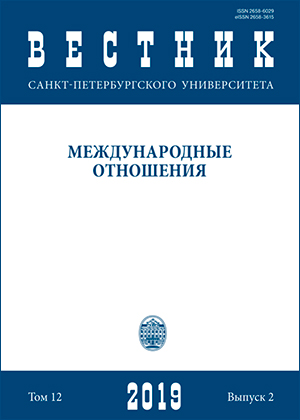Latin America in search of new formats of international cooperation
DOI:
https://doi.org/10.21638/11701/spbu06.2019.201Аннотация
The rapid spread of information and communication technologies, trans-nationalization and hybridization of international actors influenced the entire system of international relations. The globalization trend is more and more often competing with the deglobalization trend, and in the 21st century the unipolar world began to give way to a polycentric world order, where regions, formerly considered the world periphery play a special role; Latin and Caribbean America (LCA) is an example of this trend. At the same time, the new centers are often lagging behind in the scientific and technical sphere, they lack foreign investment, some of them face devaluations, many of these countries are involved in regional military and/or political conflicts. From time to time, they dramatically lose the accumulated potential of influence due to large-scale economic crises (Brazil and Venezuela in recent years are good examples of this trend). The region participates actively in many world processes and they are actively involved in integration processes within their own continent and also make a significant contribution to the development of an informal dialogue along the “South” - “South” line (such as G77, BRICS, IBSA, MIKTA). Today, LCA is also experiencing a period of formation of a new regional configuration, when new territorial reorganization contributed to the emergence of various regional groups (ALBA, CELAC, Pacific Alliance, Mesoamerica project and UNASUR). However, in the past few years, a number of events and factors have had a major impact on the LCA integration process, leading to its serious reconfiguration. The endless economic crisis and noticeable political instability in Venezuela were lethal to ALBA and UNASUR and also affected (albeit to a lesser extent) MERCOSUR. CELAC, created as a platform for cooperation and consultation under the slogan “unity in diversity”, also encountered obvious difficulties in the context of the growing political heterogeneity of the region. The LCA is about reformatting the integration process, the complementarity of the existing blocks towards each other. The purpose of this issue is to show the place of the region in the context of the system of international relations and to demonstrate the different perception of it within LCA countries, to indicate their abilities to formulate particular and common responses to new challenges, to formulate their own priorities independent from global actors' interest and to achieve them on the world stage.
Ключевые слова:
Latin and Caribbean America, multipolar world, regional integration, foreign policy, international politics, non-hemispheric actors
Скачивания
Библиографические ссылки
Zakaria, F. (2008), The Post-American World, W.W.Norton & Company, New York, USA.
Friedman, E.J., Hochstetler, K. and Clark, A.M. (2001), “Sovereign Limits and Regional Opportunities for Global Civil Society in Latin America”, Latin American Research Review, vol. 36, no. 3, pp. 7–35.
Acharya, A. (2014), The End of American World Order, Polity Press, Oxford, UK.
Post-Truth, Post-West, Post-Order? Munchen Security Conference (2017), available at: https://www.securityconference.de/en/discussion/munich-security-report/munich-security-report-2017 (accessed: 01.03.2019).
Intervención de la canciller de la República en la mesa de diálogo para la construcción de la agenda de política exterior 2017–2021: Ecuador en un mundo multipolar (2017) [Speech by the Chancellor of the Republic at the Table for Dialogue for the Construction of the Foreign Policy Agenda, 2017–2021: Ecuador in the Multipolar World], Ciudad Alfaro, Montecristi, 30 de agosto.
La canciller de Ecuador fija la paz como el primer objetivo de la política exterior [The Chancellor of Ecuador marks the peace as the first goal of the foreign policy], available at: http://www.eleconomistaamerica.cl/politica-eAm/noticias/8877849/01/18/La-canciller-de-Ecuador-fija-la-paz-como-el-primer-objetivo-dela-politica-exterior.html (accessed: 01.03.2019).
Discurso de la Canciller Claudia Ruiz Massieu en el 15 Encuentro Regional Anual para América del Norte. 11 de septiembre de 2016 [Speech by the Chancellor Claudia Ruiz Massieu at the 15th Annual Regional Meeting for the North America. September 11, 2016], available at: http://www.gob.mx/sre/prensa/discurso-de-la-canciller-claudia-ruiz-massieu-en-el-15-encuentro-regional-anual-para-america-del-norte (accessed: 01.03.2019).
World Bank Databank, URL: http://databank.worldbank.org/data/home.aspx (accessed: 06.01.2018).
Lesage, D., Van de Graaf, T. and Westphal, K. (2010), Global energy governance in a multipolar world, Ashgate, London, UK and New York, USA.
Briceño, J. and Morales, I. (2017), Post-Hegemonic Regionalism in the Americas. Towards a Pacific vs. Atlantic divide? Routledge, London, UK.
Comini, N. and Frenkel, A. (2016), “Unasur. De proyecto refundacional al fantasma del Sudamexit” [Unasur. From a Refoundational Project to the Ghost of Sudamexit], Anuario de la Integración Regional de América Latina y el Caribe, no 13, pp. 181–207.
Загрузки
Опубликован
Как цитировать
Выпуск
Раздел
Лицензия
Статьи журнала «Вестник Санкт-Петербургского университета. Международные отношения» находятся в открытом доступе и распространяются в соответствии с условиями Лицензионного Договора с Санкт-Петербургским государственным университетом, который бесплатно предоставляет авторам неограниченное распространение и самостоятельное архивирование.




